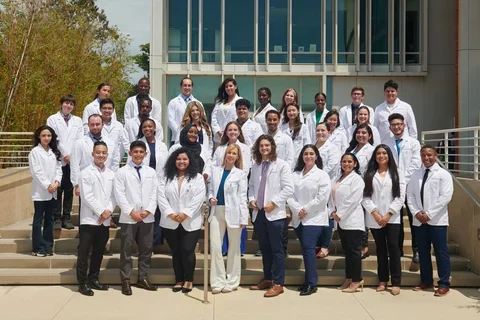UCLA Pathway program that targets diversity in medicine turns 40

“You can’t be what you can’t see.”
“You can’t be what you can’t see,” is a phrase from the UCLA Pre-Medical Enrichment Pathway Program (PREP) that stands out to Alexxandra Hurtado, a fourth-year student at California State University, Long Beach.
Hurtado is a recent graduate of the UCLA PREP program, a free, four-week program providing medical school readiness preparation and mentorship to students from social and economic disadvantaged backgrounds.
On Friday, August 19, the program celebrated its 40th anniversary with alumni as well as friends and family of the graduating class.
“Being able to meet mentors with similar backgrounds or from first-generation roots has been so empowering and motivating,” Hurtado says. “You really don’t have to explain yourself to them because they know what you’ve been though.”
Hurtado is a first-generation American and college student with roots from Jalisco, Mexico. She says the disparities her family faced in health care motivated her to pursue a career in the field.
“It wasn’t until I was in school that I realized I didn’t have as many resources as everyone else,” she says. “Other students and their parents didn’t have to worry about not having (health) insurance.”
She learned about the UCLA PREP program from a pre-medicine Bible study group at her church.
“A student in the UCLA PRIME-LA program texted me that she thought I would be a great candidate for PREP,” Hurtado recalls.
For four decades students have learned about the UCLA PREP program by word of mouth from peers, mentors, school advisors and religious groups.
Darryl Willoughby, an orthopaedic surgeon of 21 years, first heard of the program from some older fraternity brothers applying to medical school.
“My fraternity brothers introduced me to the program director, Ms. Pratt, who was very instrumental to my success,” Dr. Willoughby says.
Patricia Pratt, founder of the program and former director of academic enrichment and student outreach, was a champion for equity and diversity throughout her 25-year tenure at UCLA.
“She stopped me my sophomore year of college and reminded me that I needed to get my act together,” Dr. Willoughby recalls. “Sometimes being in a fraternity can make you lose sight of what you’re in school for, and she helped me. She was a valuable mentor.”
Dr. Willoughby, who graduated from UCLA PREP in 1984 and from medical school at the Charles R. Drew University of Medicine and Science, says the dean of student affairs also shared in his dream.
“I met some very important people while part of this program,” he says. “The dean of student affairs at the school of medicine asked me about my dreams and helped me when my father passed away while I was in med school. The dean was very supportive in getting me through that time.”
Dr. Willoughby has mentored PREP students throughout the years.
“This program is very valuable to students of color and first-generation students. I would encourage all students interested in medicine to seek out opportunities that expose them to the field and people on admissions committees,” Dr. Willoughby says. “It’s valuable to not just meet people in your PREP class, but also the counselors and administrators.”
Pathways that pay off
“We know that when patients have physicians from a similar background or lived experience, distrust disappears,” says Jennifer Lucero, MD, MA, vice-chair for Diversity, Equity & Inclusion, Anesthesia and Perioperative Medicine, and associate dean for admissions at the David Geffen School of Medicine.
In 2021, Dr. Lucero and Gerardo Moreno, MD, MS, chair of the Department of Family Medicine, applied for and received a grant from the Health Resources and Services Administration (HRSA) Centers of Excellence to help diversify the physician workforce.
They decided to target students from rural areas such as Humboldt County, where it can be difficult for the community to have access to fast, quality health care. The grant would help cover the students’ costs for housing, meals and supplies.
“We knew we wanted to partner with Cal Poly Humboldt,” says Dr. Lucero. “They are a Hispanic-serving institution and there is also a large Native American population.”
Nathan Ballew is one of ten students from Humboldt County participating in PREP this year.
“When I was nine years old, my mom, Chris McPherson, had a missed cancer diagnosis. When the cancer was eventually found, the best treatment she could get was six hours away, at University of California, San Francisco,” Ballew says.
In two years, the cancer had metastasized to her brain and lungs. Ballew’s other mom was her caretaker, so both of Ballew’s parents had to travel for treatment.
“There was nowhere for them to go in Humboldt to get her the treatment she needed,” he says.
After his mom passed away, Ballew says he became bitter and frustrated towards the health care system for a long time.
“I didn't really see the whole picture until I worked as a medical scribe for the Indian Health Service, where I was introduced to all the health disparities that the Native American community faced. I really made a connection between my mom's story and my experience, and this community,” Ballew says.
“The experience really empowered me to be a driver for change in rural communities, specifically the Native American community.”
Dr. Lucero says that people from smaller communities tend to return to practice in those communities.
“We thought that was really important when providing care to Californians,” she says. “Not many pathway programs out there have the longitudinal aspect that we have. It’s a pretty powerful program.”
Original Article: "UCLA Pathway program that targets diversity in medicine turns 40"



